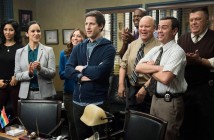26,/1/2014, 9:00 pm (EST), HBO
Ghosts haunt the edges of the frame. A man working at crab traps and digging up old pain he likes to keep buried. Another man, mowing lawns that aren’t his territory in an episode that stresses the importance to Marty of mowing his own lawn. And a sea of dead bodies, reduced to the term “DB” to hide just a sliver of how gruesome the work is. A sea of faces, washing out into an ocean of time, each of them with a look in their eyes that tells Rust they wanted it, that in their final moments they cherished the release, the chance to give in and finally stop struggling.
True Detective is an incredibly bleak show, to the point that I am starting to cherish the idea of its brief eight episode run. I’m not sure how long I could survive in the wasteland our boys traverse as they try to keep the other bad men from the door. Watching the show is like staring into the sun’s dark inverse, a black hole where all that’s staring back at you is what you try to bury, a darkness inside yourself, or just outside yourself, that makes you think none of this really matters. I don’t share the itch-black nihilism Rust spouts throughout this series, and especially throughout this episode, but this show manages to perfectly mix the exhaustion that world-view entails and the dark allure of believing you are seeing the truth of things that other people will do anything not to face.
Another advantage of the shortened run is the show doesn’t have to draw things out. Stretched to the length of even a standard cable drama, this season’s frame narrative, and the way it occasionally forces characters to talk around parts of the story we haven’t seen yet, might get grating, as might the way the modern day detectives just let Rust and Marty ramble on, almost like adult versions of the long-mute children on How I Met Your Mother. But so far, there is a nice balance between foreshadowing and letting us come to our own conclusions. We know that Rust and Marty’s partnership will come to an end, but then, watching them near it’s beginning, there’s no doubt about that. These two can work together, but they will never really gel. They scrape against each other like a boat against a dock—Marty, floating in his sea of self-rationalization and Rust a constant in his cynicism and his fortitude.
Marty clings to his delusions because they let him think he’s the man he’d like to be: dedicated husband, devoted father, provider, man. Marty tells Rust he has a troubling myopia, but his own tunnel vision doesn’t let him see just how narrow his world-view is, nor how skewed his vision of his family is. His wife and children are little more than paper dolls to him, props in a bedtime story he tells himself that lets him nod off thinking of himself as a saint. Rust doesn’t have those props. And Rust doesn’t sleep.
This all leads to the episode’s most fascinating scene and a central contradiction neither of our detectives see. When they speak to that old man with his crab traps, the grandfather of a woman they think might have been an earlier victim of Dora Lang’s killer, he talks about the way first his daughter, then his granddaughter ran away and left him. Marty talks about using family to give the world rules, and thus a shape, and this is a man who lost his family to the winds. He stayed behind to maintain things, a rock stabilizing nothing in particular. In some ways, he lived the life Marty thinks a man should live. Yet the man reminds Marty of Rust. Marty sees a man without anything to anchor him drifting in his boat, playing with his traps, and what he misses is, that man is him, with a box stored away to remind him of all that he lost through his mistakes. Rust doesn’t believe anything has any meaning because it makes everything slipping through his fingers easier to handle. Marty is pushing his family away and failing to see the consequences that will have.
When the two visit the church, Marty mentions that a world without religion would be a world full of monsters. He thinks that without faith, morality would crumble, just as he imagines that without a family, a man would lose his structure. But while he preaches family and fidelity, Marty cheats on his wife and goes into a drunken rage at his mistress. He looks a sight more like what Rust sees in that church than he might like. Rust sees a crowd of people wearing masks, who behave as they would anyway, and then sit in a pew on Sunday and try to pretend away their sins. Marty thinks faith and family give the world structure; Rust thinks they are wallpaper over the rot at our core.
In an episode that shows some of the weaknesses of the season’s frame structure, “The Locked Room” also ends with perhaps its greatest achievement yet. We know something very bad is waiting for Rust and Marty on that desolate farm that looks like just another burned out, ghost haunted stretch of Louisiana highway. And then, we see it, just for a second, that monster at the end of the dream. A creature, barely a man, stalking in from the edge of that frame, wearing underwear and a gas mask, skulking like evil personified. We see a hint of where this is all headed. And then we see blackness, like the sort Rust sees all the time, like the sort that man has caused those women to see, like the sort we all see in the end.
The Roundup
- -“If the common good’s gotta make up fairy tales, then it’s not good for anybody.”
- -“What’s it say about life, you got to get together, tell each other stories that defy every known law of the universe, just to get yourself through the day?”
- -“People incapable of guilt usually do have a good time.” “I try not to be too hard on myself.” “Well that’s real big of you.”
- -“Your life accommodates you. You don’t have to be afraid of loss.”
- -“People give you rules. Rules describe the shape of things.”
- -“Guys don’t give things chances. I don’t know why that is.” “It’s because we know what we want. And we don’t mind being alone.”
- -“The world needs bad men. We keep the other bad men from the door.”
- -“And like a lot of dreams, there’s a monster at the end of it.”




